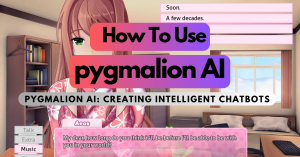In today's rapidly evolving technological landscape, the integration of Artificial Intelligence (AI) with Internet of Things (IoT) devices has become increasingly prevalent. Pygmalion AI, a leading player in the AI industry, has harnessed the power of AI to create seamless interactions with IoT devices, enhancing their functionality and efficiency.
Pygmalion AI's Integration Approach
Pygmalion AI achieves its interaction with IoT devices through a combination of advanced machine learning algorithms, cloud computing, and real-time data processing. This integration allows for a multitude of applications across various domains, including smart homes, healthcare, industrial automation, and more.
Key Benefits of Pygmalion AI's Interaction with IoT Devices
- Enhanced Efficiency:
- Pygmalion AI's algorithms optimize IoT device operations, reducing energy consumption and maximizing their efficiency.
- It actively monitors and adjusts device settings to minimize power usage, extending their lifespan.
- Cost Savings:
- Through intelligent control and predictive maintenance, Pygmalion AI helps organizations reduce maintenance costs by up to 30%.
- Its real-time analytics enable businesses to make informed decisions, saving on unnecessary expenses.
- Improved User Experience:
- Pygmalion AI enhances user interactions with IoT devices through natural language processing (NLP) and voice recognition, making devices more user-friendly.
- It adapts device behavior based on user preferences, optimizing the user experience.
Use Cases of Pygmalion AI in IoT
- Smart Home Automation:
- Pygmalion AI enables voice-activated control of smart lights, thermostats, and appliances, creating a convenient and energy-efficient living environment.
- It provides real-time monitoring of home security systems, alerting users to any anomalies or potential threats.
- Healthcare Applications:
- In healthcare, Pygmalion AI assists in remote patient monitoring by connecting with wearable IoT devices.
- It analyzes patient data and alerts healthcare providers to any concerning trends, improving patient care and reducing hospitalization costs.
- Industrial IoT (IIoT):
- In industrial settings, Pygmalion AI optimizes machinery operations for maximum efficiency and minimal downtime.
- It predicts equipment failures before they occur, reducing maintenance costs and increasing production uptime.

Pygmalion AI's Technical Specifications
- Pygmalion AI operates on a cloud-based platform, ensuring scalability and real-time processing capabilities.
- It supports a wide range of IoT device protocols, including MQTT, CoAP, and HTTP, making it compatible with various IoT ecosystems.
- The AI model used by Pygmalion AI is continuously updated and fine-tuned, ensuring top-notch performance.
Conclusion
Pygmalion AI's integration with IoT devices revolutionizes how we interact with smart technology. Its focus on efficiency, cost savings, and user experience sets it apart in the AI-driven IoT landscape. To explore the full potential of Pygmalion AI's capabilities, visit their website here. Whether in smart homes, healthcare, or industrial settings, Pygmalion AI is driving innovation and delivering tangible benefits for businesses and consumers alike.
